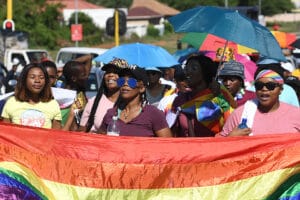Botswana court rejects cruel bid to re-criminalise gay sex in ‘huge win’ for LGBT+ community

Botswana upholds law decriminalising gay sex (MONIRUL BHUIYAN/AFP via Getty Images)
Botswana’s Court of Appeal has upheld a 2019 ruling that decriminalised gay sex in a “huge win” for the LGBT community.
In June 2019, the Botswana High Court struck down Section 164 of the country’s penal code, which outlawed sex between men.
Until then, gay sex was punishable by up to seven years in prison.
The ruling was challenged in July of the same year, when attorney general Abraham M. Keetshabe launched an appeal to re-establish the colonial-era law.
The appeal was scrapped on Monday (29 November), and following the two-year legal battle, Botswana has now upheld that same-sex relations between men are legal.
Court of Appeal judge president Ian Kirby announced the decision, which was unanimous among the court’s five judges, and said sections of the penal code banning same-sex relations “have outlived their usefulness, and serve only to incentivise law enforcement agents to become key-hole peepers and intruders into the private space of citizens”.
Ghanaian human rights group Rightify Ghana called the decision a “huge win”.
“A huge win for the LGBTQ community in Botswana, as the country’s Court of Appeal has upheld a 2018 ruling, decriminalising consensual same-sex relationships,” the group said on Twitter.
“Congratulations to the LGBTQ community, especially activists and those who led this good fight.”

The first Botswana Pride Parade in Gaborone in 2019 (MONIRUL BHUIYAN/AFP via Getty Images)
Outside of the court, Sethunya Mosime, chair of the Lesbians, Gays, and Bisexuals of Botswana (LEGABIBO), told Reuters: “This will forever change the landscape of democracy, human rights and equality in Botswana. Finally the state will have no business in what two consenting adults do in their privacy.”
Same-sex couples in Botswana, however, still have no legal recognition, whether in the form of marriage or civil partnerships.
In 2019, following the ruling, Anna Mmolai-Chalmers, CEO of LEGABIBO, said: “It has taken a long time for our community to be where it is.
“This incredibly life-changing decision, although it does not right all the wrongs done to individual members of the LGBT community, is a step towards restoring our dignity as human beings.
“The decision has several implications for the LGBTIQ community… Not only does it provide legal affirmation and recognition of the rights of LGBTIQ persons, but it allows an important space for addressing public health issues more efficiently and effectively.
“We can finally start building a more tolerant society. The real work starts now.”

